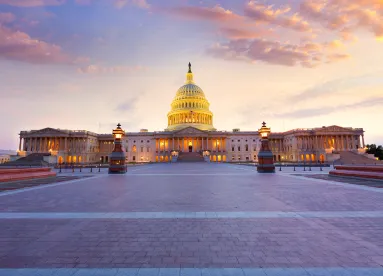On March 17, 2020, the District of Columbia unanimously passed the COVID-19 Response Emergency Amendment Act of 2020. The act affects both unemployment benefits and the D.C. Family Medical Leave Act (FMLA).
With respect to unemployment benefits, the act extends unemployment eligibility to “affected employees,” defined as employees who otherwise are eligible for unemployment and who have become “unemployed or partially unemployed” as a result of the circumstances giving rise to the public health emergency. This term specifically includes:
-
An employee who has been quarantined or isolated by the Department of Health or any other applicable D.C. or federal agency
-
An employee who has self-quarantined or self-isolated in a manner consistent with the recommendations or guidance of the Department of Health, any other applicable D.C. or federal agency, or a medical professional
-
An employee of an employer that ceased or reduced operations due to an order or guidance from the mayor or the Department of Health or a reduction in business revenue resulting from the circumstances giving rise to the public health emergency, as determined by the mayor
Affected employees are entitled to unemployment benefits (with no work search requirement) regardless of whether the employer has provided a date certain for return to work and regardless of whether the employee has a reasonable expectation of continued employment. Benefits paid to affected employees pursuant to the emergency legislation will not be charged to the employer’s experience rating. The legislation also authorizes payment of such benefits from other available sources of District funding in the event that federal law or regulation would preclude payment of such benefits from the District of Columbia’s unemployment fund.
The act also specifically includes the following within the definition of “good cause” for an employee to voluntarily leave a job without being disqualified from benefits:
-
An employer’s failure to timely comply with a written directive from the mayor or the Department of Health in relation to public safety measures necessary to protect its employees or the public during the public health emergency
-
An employer’s requirements that an employee be physically present in the workplace despite the employee having:
-
Been quarantined or isolated by the Department of Health or any other applicable D.C. or federal agency
-
Self-quarantined or self-isolated in a manner consistent with the recommendations or guidance of the Department of Health, any other applicable D.C. or federal agency, or a medical professional
-
Additionally, the act extends protections of the D.C. FMLA, which applies to employers with 20 or more employees and provides that covered employees (i.e., those with at least one year and 1,000 hours of service) up to 16 weeks of medical and 16 weeks of family leave (unpaid) in a two-year period. The act provides that during a period of public health emergency declared by the mayor, these employee eligibility requirements do not apply to an employee who has been ordered or recommended to quarantine or isolate by the Department of Health, any other D.C. or federal agency, or a medical professional.
The act also creates a new “declaration of emergency leave” that applies to all employers irrespective of size, and extends leave to an employee who is unable to work as a result of the public health emergency. A recommendation from the mayor, Department of Health, any other D.C. or federal agency, or a medical professional that the employee self-quarantine or self-isolate shall serve as certification of the need for such leave, and, in the case of a government-mandated quarantine or isolation, the declaration of public health emergency shall serve as certification of the need for such leave.
The act applies as of March 11, 2020, and as emergency legislation, will remain in effect for a period of 90 days. D.C. may enact further legislation to extend it if circumstances warrant.





 />i
/>i

